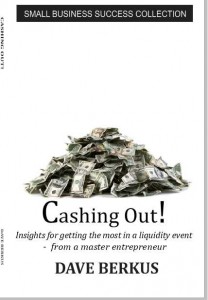Dave’s note: For the second time, we invite Basil Peters, author of “Early Exits,” back as our guest – to provide more of his insight into the “when” to exit by selling your business. In future weeks, we’ll add the voices of other well-known professionals in the field of exits to my own, and try to give you a compendium of useful advice in the process.
By Basil Peters
Most entrepreneurs wait too long to start thinking about their exit. They usually sell their companies for much less than they could have.
That’s exactly what I did in my first company. It was the first time I lost several million dollars, and the first of many similarly expensive – and valuable – lessons about exits.
 I recently met with two bright entrepreneurs who are building a company in an exciting niche market riding on a long term trend. These two young founders chose their space well and were already global leaders in their niche. They had prototypes in the market and a respectable global mind share.
I recently met with two bright entrepreneurs who are building a company in an exciting niche market riding on a long term trend. These two young founders chose their space well and were already global leaders in their niche. They had prototypes in the market and a respectable global mind share.
[Email readers, continue here…] Their niche was heating up quickly – unfortunately for them. In the previous six months, I’d read several articles in finance blogs or newsletters about yet another company that had just been financed in their specific vertical. Most of the financings I read about were for $5 million to $20 million. In contrast, this local company had been built on something around $1 million in equity.
This is a scenario I’ve seen about a hundred times before – too much money flushing into a space the VCs think will be hot. Too many companies being founded with exactly the same business plan.
These entrepreneurs were too young to attract the amount of capital they’d need to compete in this new environment. They had only two strategic options – an early exit, or hiring a ‘name CEO’ that might be able to raise a big enough round in time. I recommended an exit because I knew the money flowing in to their space would also increase valuations – possibly by 2x to 5x over normal ranges.
You can probably guess the young entrepreneurs wanted to wait a ‘little longer.’
I don’t want to be too hard on these young entrepreneurs. They were mostly victims of their own human nature.
They just couldn’t think about selling because they were having too much fun. They were leaders in their market and big companies were enquiring about huge orders. They knew their revenues were getting ready to grow – and possibly explode.

Dave’s book on exits. See http://berkus.com/shop/ for this and more from Dave
Unfortunately, they couldn’t appreciate that it was also the absolute best time to sell their company. In fact, they should have started the exit process six to twelve months earlier.
Human nature also affects the buyers. They will always pay the most when everything is going perfectly and the future looks even brighter. The buyers’ human nature also means that a skilled M&A advisor can usually sell for a lot more based on the ‘promise’ rather than the ‘reality.’
And human nature works against the entrepreneurs on the downside. This one ends up costing most entrepreneurs and their investors a lot of money, because most of the time CEOs and boards wait until it’s pretty clear that the company’s value has peaked before starting the exit process. By the time the buyers get to serious price negotiations, it’s also clear to them that the company’s best days are behind it. And another six to eighteen months have passed, usually allowing the trend to extend even further.
With exits, like many things in business and life, timing can be (almost) everything.








